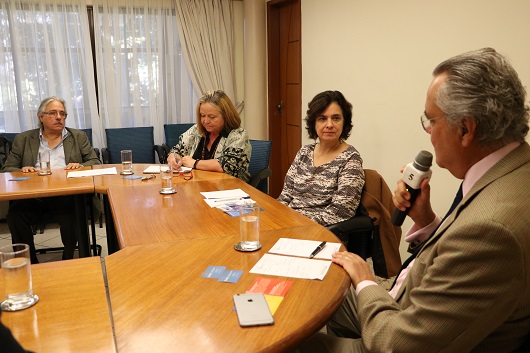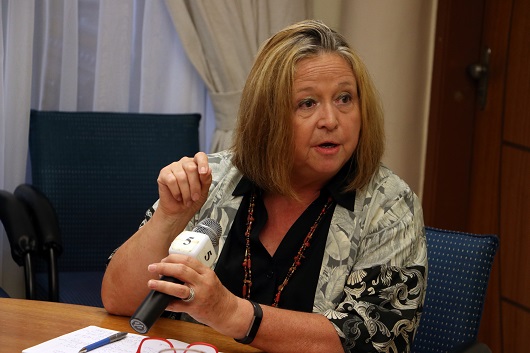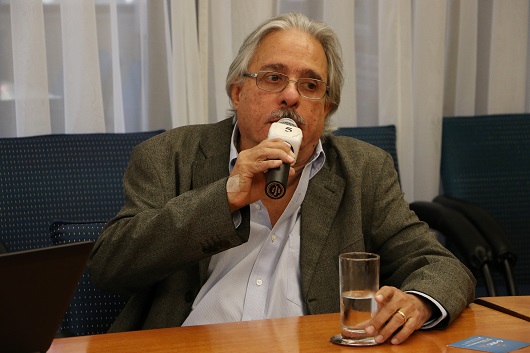With Fiocruz participation, event will discuss technology and innovation for the SDG
15/10/2018
Julia Dias
Science, technology and innovation are crucial for achieving the Sustainable Development Goals (SDG), UN’s ambitious target plan for 2030. “With the technology currently available today, we cannot solve the world’s problems”, explains Veerle Vandeweerd, former UN employee and sustainable development expert. With that in mind, in November, the Flemish Institute for Technological Research (VITO, in Dutch), collectively with other non-profit science and technology institutions, including Fiocruz, will hold a global sustainable technology and innovation conference series, G-STIC, in Brussels, Belgium, this year.
Photo: Peter Ilicciev
“This is a very young initiative, created only 20 months ago, and it intends to use technology and its innovative potential to speed up implementation of the 2030 Agenda”, said Vandeweerd, who is currently the director of G-STIC policies, in Fiocruz meetings, that she attended on August 27th and 29th to present and discuss the program and vision of the event. The Foundation was invited as one of the co-hosts of G-STIC and will be in charge of the health thematic group.
In addition to health, one of the new themes incorporated in 2018, the following themes are also covered by the event: Wastewater and Resource Recovery, Circular Economy, Agroecology for Sustainable Food Systems, Energy Positive Communities, Education, and Geospatial Data. The last two themes are new thematic axes. “We want to set priorities and we will keep addressing the same themes until we find a sustainable solution for them”, said UN former employee.

“We want to set priorities and we will keep addressing the same themes until we find a sustainable solution for them”, said Vandeweerd. Photo: Peter Ilicciev
“We are seeking for innovative technologies that can be readily introduced in the market. But not only that, these technologies should also be socially acceptable, feasible, cost-effective and profitable. In addition to having large-scale production potential”, said Vandeweerd, who explained the event is not supposed to be an academic event, but a technological conference with representatives of the scientific community, in addition to UN agencies, governments, the private sector and the civil society. “We need everyone if we want to make changes”, she added.
Gender integration, youth engagement, and urban development are also among the concerns of the event. These are some of the crosscutting themes that will guide discussions. The idea is that these topics guide all groups and that it is possible to assess, in the final plenary session, how much the solutions presented for each theme can impact those items. An open-call challenge and an exhibition of innovative technologies complete the program, which will provide participants with access to some of the solutions presented.
The role of Fiocruz
Fiocruz plays a fundamental role in G-STIC as a new partner. In addition to organizing the health thematic group and being a co-host, Fiocruz is Latin America’s only institution to take part in the event, representing an important group in the region. “Fiocruz approach is unique, you guys see health in a very innovative way”, said G-STIC representative, who considered the Brazilian Unified Healthcare System (SUS) an example to be followed. 
Director of the Fiocruz Strategy for the 2030 Agenda, Gadelha believes the event can promote the idea of Health in all policies. Photo: Peter Ilicciev
“G-STIC represents an opportunity for reaching other areas in science, technology and innovation which are not linked to our traditional partners, it’s a great chance to interact with other agencies, institutes and players, especially in health”, said Paulo Gadelha, director of Fiocruz Strategy for the 2030 Agenda who is leading the Vito partnership. Gadelha believes the event can promote Fiocruz vision on health in all goals of the 2030 Agenda and in all policies, as foreseen by WHO. In this sense, Fiocruz representatives reinforced the need to interact with the other work groups in the conference, including agroecology and water, where the institution also plays a fundamental role.
At the time, Fiocruz innovative technologies were also introduced, which can potentially be presented in the event and replicated in other corners of the world. This is the case of the World Mosquito Project, a project designed to fight dissemination of Aedes aegypti-borne diseases. The project introduced mosquitos with the Wolbacchia bacterium, with reduced capacity to spread arboviral diseases like zika, dengue fever, chikungunya and yellow fever.


